Chapter 16
Getting Around
In This Chapter
 Traveling by plane
Traveling by plane
 Breezing through customs
Breezing through customs
 Shuttling around town
Shuttling around town
Traveling halfway around the world to Zhōngguó 中国 (中國) (joong-gwaw) (China) can be a long haul. Knowing the magic traveling words and phrases in Chinese can make your journey as efficient and comfortable as possible. This chapter helps you make your way around the airport and the airplane, survive the customs experience, and board different types of transportation after you reach your destination.
Flying Around the Airport
Consider yourself a veteran traveler just because you’ve been all through Europe and the Americas? Well, my friend, you’re in for a rude awakening. When it comes to finding your way around China, English (or any other Western language) does you little good. You spend a lot of unproductive time trying to interpret the signs to get some sense of which line to stand in and where to go next at the fēijīchǎng 飞机场 (飛機場) (fay-jee-chahng) (airport). You need to at least know the pīnyīn 拼音 (pin-yin) (Literally: spelled the way it sounds) Romanization system, if not Chinese characters themselves. If you don’t, you’ll be up a creek without a paddle. You may end up following the guy next to you, even if it takes you to the bathroom rather than baggage claims. (See Chapter 1 for more about the pīnyīn system of spelling Chinese words.)
Good move to get a head start by reading Chinese For Dummies in advance of your trip. You can bone up on some essential words and phrases before the whole airport experience makes you want to get right back on the next plane bound for home.
Making it past the check-in counter
Ready to bànlǐ dēngjī shǒuxù 办理登记手续 (辦理登記手續) (bahn-lee duhng-jee show-shyew) (check in)? After lugging your bags up to this point, you finally get to tuōyùn 托运 (托運) (twaw-yewn) (check) your xínglǐ 行李 (sheeng-lee) (luggage). You receive a dēngjīpái 登机牌 (登機牌) (duhng-jee-pye) (boarding pass) at the check-in counter, at which point you’re ready to make your way to the appropriate chūkǒu 出口 (choo-ko) (gate), taking only your shǒutí xínglǐ 手提行李 (show-tee sheeng-lee) (carry-on luggage).
All sorts of questions may be running through your mind about now. Here are some basic phrases that may come in handy during check-in:
 Fēijī jǐ diǎn qǐfēi? 飞机几点起飞? (飛機幾點起飛?) (fay-jee jee dyan chee-fay?) (What time does it depart?)
Fēijī jǐ diǎn qǐfēi? 飞机几点起飞? (飛機幾點起飛?) (fay-jee jee dyan chee-fay?) (What time does it depart?)
 Wǒde hángbān hàomǎ shì duōshǎo? 我的航班号码是多少? (我的航班號碼是多少?) (waw-duh hahng-bahn how-mah shir dwaw-shaow?) (What’s my flight number?)
Wǒde hángbān hàomǎ shì duōshǎo? 我的航班号码是多少? (我的航班號碼是多少?) (waw-duh hahng-bahn how-mah shir dwaw-shaow?) (What’s my flight number?)
 Wǒ xiǎng tuōyùn xíngli. 我想托运行李. (我香托運行李.) (waw shyahng twaw-yewn sheeng-lee.) (I’d like to check my luggage.)
Wǒ xiǎng tuōyùn xíngli. 我想托运行李. (我香托運行李.) (waw shyahng twaw-yewn sheeng-lee.) (I’d like to check my luggage.)
 Wǒ xiǎng yào kào chuāng de wèizi. 我想要靠窗的位子. (waw shyahng yaow cow chwahng duh way-dzuh.) (I’d like a window seat.)
Wǒ xiǎng yào kào chuāng de wèizi. 我想要靠窗的位子. (waw shyahng yaow cow chwahng duh way-dzuh.) (I’d like a window seat.)
 Wǒ xiǎng yào kào guòdào de wèizi. 我想要靠过道的位子. (我想要靠過道的位子.) (waw shyahng yaow cow gwaw-daow duh way-dzuh.) (I’d like an aisle seat.)
Wǒ xiǎng yào kào guòdào de wèizi. 我想要靠过道的位子. (我想要靠過道的位子.) (waw shyahng yaow cow gwaw-daow duh way-dzuh.) (I’d like an aisle seat.)
 Zài jǐ hào mén hòujī? 在几号门候机? (在幾號門候機?) (dzye jee how mun ho-jee?) (Which gate do we leave from?)
Zài jǐ hào mén hòujī? 在几号门候机? (在幾號門候機?) (dzye jee how mun ho-jee?) (Which gate do we leave from?)
 Zhè shì wŏde hùzhào. 这是我的护照. (這是我的護照.) (jay shir waw-duh hoo-jaow.) (Here’s my passport.)
Zhè shì wŏde hùzhào. 这是我的护照. (這是我的護照.) (jay shir waw-duh hoo-jaow.) (Here’s my passport.)
After you check in, you may encounter all sorts of unpleasant surprises. Perhaps the plane can’t zhèngdiǎn qǐfēi 正点起飞 (正點起飛) (juhng-dyan chee-fay) (depart on time) after all and the airline must tuīchí 推迟 (推遲) (tway-chir) (postpone) your departure or qǔxiāo 取消 (chyew-shyaow) (cancel) it altogether. Maybe the tiānqì 天气 (天氣) (tyan-chee) (weather) is causing the problems.
Talkin’ the Talk
Zhíyuán:
Nín hǎo. Qǐng chūshì nínde jīpiào.
neen how. cheeng choo-shir neen-duh jee-pyaow.
Hello. Your ticket, please.
Shí Píng:
Jiù zài zhèr.
jyo dzye jar.
Here it is.
Zhíyuán:
Nín shì bú shì qù Běijīng? Néng kànkàn nínde hùzhào ma?
neen shir boo shir chyew bay-jeeng? nuhng kahn-kahn neen-duh hoo-jaow mah?
Are you going to Beijing? May I see your passport?
Shí Píng:
Kěyǐ.
kuh-yee.
Here you are.
Zhíyuán:
Yǒu jǐ jiàn xíngli?
yo jee jyan sheeng-lee?
How many suitcases do you have?
Shí Píng:
Wǒ yǒu sānge xiāngzi.
waw yo sahn-guh shyahng-dzuh.
I have three suitcases.
Zhíyuán:
Yǒu méiyǒu shǒutí xíngli?
yo mayo show-tee sheeng-lee?
Do you have any carry-on luggage?
Shí Píng:
Wǒ zhǐ yǒu yíge gōngwénbāo.
waw jir yo ee-guh goong-one-baow.
I have only one briefcase.
Zhíyuán:
Hǎo. Nín yào kào guòdào de wèizi háishì yào kào chuāng de wèizi?
how. neen yow cow gwaw-daow duh way-dzuh hi-shir yaow cow chwahng duh way-dzuh?
All right. Would you like an aisle or a window seat?
Shí Píng:
Wǒ xiǎng yào kào guòdào de wèizi.
waw shyahng yaow cow gwaw-daow duh way-dzuh.
I’d like an aisle seat.
Zhíyuán:
Hǎo. Zhèi shì nínde dēngjīpái. Qù Běijīng de 108 cì bānjī, 19 pái, B zuò.
how. jay shir neen-duh duhng-jee-pye. chyew bay-jeeng duh ee-bye-leeng-bah tsuh bahn-jee, shir-jyo pye, B dzwaw.
Fine. Here’s your boarding pass. Flight 108 to Beijing, Row 19, Seat B.
Shí Píng:
Xièxiè.
shyeh-shyeh.
Thanks.
Zhíyuán:
Zhè shì nínde xínglǐ lǐngqǔdān. Dàole Běijīng yǐhòu kěyǐ lǐngqǔ nínde xínglǐ.
jay shir neen-duh sheeng-lee leeng-chyew-dahn. dow-luh bay-jeeng ee-ho kuh-yee leeng-chyew neen-duh sheeng-lee.
Here are your luggage claim tags. After you arrive in Beijing, you can claim your luggage.
Shí Píng:
Xièxiè.
shyeh-shyeh.
Thanks.
Zhíyuán:
Zhù nín yí lù píng ān.
joo neen ee loo peeng ahn.
Have a nice trip.
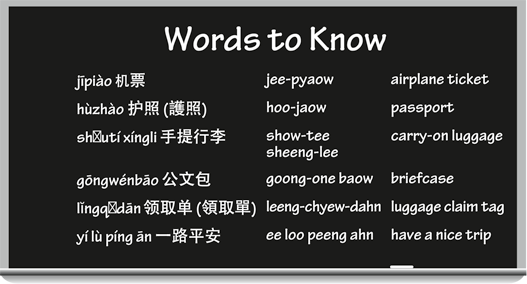
Boarding your flight
Okay! You’re all set to board the fēijī 飞机 (飛機) (fay-jee) (airplane). Are you lucky enough to sit in the tóuděngcāng 头等舱 (頭等艙) (toe-duhng-tsahng) (first class) section, or do you have to sit in jīngjìcāng 经济舱 (經濟艙) (jeeng-jee-tsahng) (economy class) the whole time? Either way, here are some people you see get on the plane (at least I hope you do):
 chéngwùyuán 乘务员 (乘務員) (chung-woo-ywan) (flight attendants)
chéngwùyuán 乘务员 (乘務員) (chung-woo-ywan) (flight attendants)
 jiàshǐyuán 驾驶员 (駕駛員) (jyah-shih-ywan) (pilot)
jiàshǐyuán 驾驶员 (駕駛員) (jyah-shih-ywan) (pilot)
 jīzǔ 机组 (機組) (jee-dzoo) (crew)
jīzǔ 机组 (機組) (jee-dzoo) (crew)
And if you’re like me, you get worried about some things as the plane begins to taxi down the runway:
 qǐfēi 起飞 (起飛) (chee-fay) (takeoff)
qǐfēi 起飞 (起飛) (chee-fay) (takeoff)
 qìliú 气流 (氣流) (chee-lyo) (turbulence)
qìliú 气流 (氣流) (chee-lyo) (turbulence)
 zhuólù 着陆 (著陸) (jwaw-loo) (landing)
zhuólù 着陆 (著陸) (jwaw-loo) (landing)
Aaah! I get nervous just thinking about them. It’s okay, though. The chéngwùyuán are on to people like you and me. That’s why they make sure to tell you before takeoff where the jiùshēngyī 救生衣 (jyo-shung ee) (life vests) and jǐnjí chūkǒu 紧急出口 (緊急出口) (jin-jee-choo-ko) (emergency exits) are located. You may also hear them bark out the following instructions, if you haven’t already managed to tune everything out:
 Bǎ tuōpán cānzhuō shōu qǐlái. 把托盘餐桌收起来. (把托盤餐桌收起來.) (bah twaw-pahn tsahn-jwaw show chee-lye.) (Put your tray table back.)
Bǎ tuōpán cānzhuō shōu qǐlái. 把托盘餐桌收起来. (把托盤餐桌收起來.) (bah twaw-pahn tsahn-jwaw show chee-lye.) (Put your tray table back.)
 Bǎ nǐde zuòyǐ kàobèi fàngzhí. 把你的座位靠背放
Bǎ nǐde zuòyǐ kàobèi fàngzhí. 把你的座位靠背放 . (bah nee-duh dzwaw-ee cow-bay fahng-jir.) (Put your seat back to the upright position.)
. (bah nee-duh dzwaw-ee cow-bay fahng-jir.) (Put your seat back to the upright position.)
 Bù zhǔn chōuyān. 不准抽烟. (不准抽煙.) (boo jwun cho-yan.) (No smoking permitted.)
Bù zhǔn chōuyān. 不准抽烟. (不准抽煙.) (boo jwun cho-yan.) (No smoking permitted.)
 Jìjǐn nǐde ānquándài. 系紧你的安全带. (繫紧你的安全帶.) (jee-jin nee-duh ahn-chwan-dye.) (Fasten your seat belt.)
Jìjǐn nǐde ānquándài. 系紧你的安全带. (繫紧你的安全帶.) (jee-jin nee-duh ahn-chwan-dye.) (Fasten your seat belt.)
 Rúguǒ kōngqì yālì yǒu biànhuà, yǎngqìzhào huì zìdòng luòxià. 如果气压壓力有变化, 氧气罩会自动落下. (如果空氣壓力有變化,氧氣罩會自動落下.) (roo-gwaw koong-chee yah-lee yo byan-hwah, yahng-chee-jaow hway dzuh-doong lwaw-shyah.) (If there’s any change in air pressure, the oxygen mask will automatically drop down.)
Rúguǒ kōngqì yālì yǒu biànhuà, yǎngqìzhào huì zìdòng luòxià. 如果气压壓力有变化, 氧气罩会自动落下. (如果空氣壓力有變化,氧氣罩會自動落下.) (roo-gwaw koong-chee yah-lee yo byan-hwah, yahng-chee-jaow hway dzuh-doong lwaw-shyah.) (If there’s any change in air pressure, the oxygen mask will automatically drop down.)
If you’re not a nervous flyer, you’ll probably spend all your time listening to music through the ěrjī 耳机 (耳機) (are-jee) (headset), flipping dials on the radio or channels on the television, or trying to sleep. Hopefully the flight is showing a good diànyǐng 电影 (電影) (dyan-yeeng) (movie) on such a long trip.
Going through customs
If you survive all the turbulence and the boring movie on your long flight without having a breakdown, good for you! The next test you have to get through is the hǎiguān 海关 (海關) (hi-gwahn) (customs) experience. After you get to customs, you see many hǎiguān guānyuán 海关关员 (海關關員) (hi-gwahn gwahn-ywan) (customs officers), none of whom may understand English. Table 16-1 lists the items you need to have ready at customs. The following phrases should come in handy, too:
 Nǐ dǒng Yīngyǔ ma? 你懂英语吗? (你懂英語嗎?) (nee doong eeng-yew mah?) (Do you understand English?)
Nǐ dǒng Yīngyǔ ma? 你懂英语吗? (你懂英語嗎?) (nee doong eeng-yew mah?) (Do you understand English?)
 Wǒ shì Jiānádà rén. 我是加拿大人. (waw shir jyah-nah-dah run.) (I’m Canadian.)
Wǒ shì Jiānádà rén. 我是加拿大人. (waw shir jyah-nah-dah run.) (I’m Canadian.)
 Wǒ shì Měiguó rén. 我是美国人. (我是美國人.) (waw shir may-gwaw run) (I’m American.)
Wǒ shì Měiguó rén. 我是美国人. (我是美國人.) (waw shir may-gwaw run) (I’m American.)
 Wǒ shì Yīngguó rén. 我是英国人. (我是英國人.) (waw shir eeng-gwaw run.) (I’m British.)
Wǒ shì Yīngguó rén. 我是英国人. (我是英國人.) (waw shir eeng-gwaw run.) (I’m British.)
 Xǐshǒujiān zài nǎr? 洗手间在哪儿? (洗手間在哪兒?) (she-show-jyan dzye nar?) (Where are the restrooms?)
Xǐshǒujiān zài nǎr? 洗手间在哪儿? (洗手間在哪兒?) (she-show-jyan dzye nar?) (Where are the restrooms?)
Table 16-1 Items to Have Ready at Customs
|
Chinese |
Pronunciation |
English |
|
bāo 包 |
baow |
bag |
|
chūjìng dēngjì kǎ 出境登记卡 (出境登記卡) |
choo-jeeng duhng-jee kah |
departure card |
|
jiànkāng zhèng 健康证 (健康證) |
jyan-kahng jung |
health certificate |
|
jiǔ 酒 |
jyo |
alcohol (to declare) |
|
rùjìng dēngjì kǎ 入境登记卡 (入境登記卡) |
roo-jeeng duhng-jee kah |
arrival card |
|
shēnbào de wùpǐn 申报的物品 (申報的物品) |
shun-baow duh woo-peen |
articles to declare |
|
xingyān 香烟 (香煙) |
shyahng-yan |
cigarettes (to declare) |
|
xiāngzi 箱子 |
shyahng-dzuh |
suitcase |
|
xínglǐ 行李 |
sheeng-lee |
luggage |
The hǎiguān guānyuán may ask you a couple of these important questions:
 Nǐ dǎsuàn zài zhèr dāi duōjiǔ? 你打算在这儿待多久? (你打算在這兒待多久?) (nee dah-swan dzye jar dye dwaw-jyo?) (How long do you plan on staying?)
Nǐ dǎsuàn zài zhèr dāi duōjiǔ? 你打算在这儿待多久? (你打算在這兒待多久?) (nee dah-swan dzye jar dye dwaw-jyo?) (How long do you plan on staying?)
 Nǐ lái zhèr shì bàn gōngwù háishì lǚyóu? 你来这儿是办公务还是旅游? (你來這兒是辦公務還是旅遊?) (nee lye jar shir bahn goong-woo hi-shir lyew-yo?) (Are you here on business or as a tourist?)
Nǐ lái zhèr shì bàn gōngwù háishì lǚyóu? 你来这儿是办公务还是旅游? (你來這兒是辦公務還是旅遊?) (nee lye jar shir bahn goong-woo hi-shir lyew-yo?) (Are you here on business or as a tourist?)
 Nǐ yǒu méiyǒu yào shēnbào de wùpǐn? 你有没有要申报的物品? (你有沒有要申報的物品?) (nee yo mayo yaow shun-baow duh woo-peen?) (Do you have anything you want to declare?)
Nǐ yǒu méiyǒu yào shēnbào de wùpǐn? 你有没有要申报的物品? (你有沒有要申報的物品?) (nee yo mayo yaow shun-baow duh woo-peen?) (Do you have anything you want to declare?)
 Qǐng gěi wǒ kànkàn nǐde hǎiguān shēnbàodān. 请给我看看你的海关申报单. (請給我看看你的海關申報單.) (cheeng gay waw kahn-kahn nee-duh hi-gwan shun-baow-dahn.) (Please show me your customs declaration form.)
Qǐng gěi wǒ kànkàn nǐde hǎiguān shēnbàodān. 请给我看看你的海关申报单. (請給我看看你的海關申報單.) (cheeng gay waw kahn-kahn nee-duh hi-gwan shun-baow-dahn.) (Please show me your customs declaration form.)
 Qǐng gěi wǒ kànkàn nǐde hùzhào. 请给我看看你的护照. (請給我看看你的護照.) (cheeng gay waw kahn-kahn nee-duh hoo-jaow.) (Please show me your passport.)
Qǐng gěi wǒ kànkàn nǐde hùzhào. 请给我看看你的护照. (請給我看看你的護照.) (cheeng gay waw kahn-kahn nee-duh hoo-jaow.) (Please show me your passport.)
Customs agents aren’t the only people with questions to ask. You may have some questions you want to try out yourself:
 Wǒ yào fù shuì ma? 我要付税吗? (我要付稅嗎?) (waw yaow foo shway mah?) (Must I pay duty?)
Wǒ yào fù shuì ma? 我要付税吗? (我要付稅嗎?) (waw yaow foo shway mah?) (Must I pay duty?)
 X guāng huì sǔnhuài wǒde jiāojuǎn ma? X光会损坏我的胶卷 吗? (X光會損壞我的膠卷嗎?) (X gwahng hway swuhn-hwye waw-duh jyaow-jwan mah?) (Will the X-ray damage my film?)
X guāng huì sǔnhuài wǒde jiāojuǎn ma? X光会损坏我的胶卷 吗? (X光會損壞我的膠卷嗎?) (X gwahng hway swuhn-hwye waw-duh jyaow-jwan mah?) (Will the X-ray damage my film?)
 Xínglǐ kéyǐ shōu qǐlái ma? 行李可以收起来吗? (行李可以收起來嗎?) (sheeng-lee kuh-yee show chee-lye mah?) (May I close my suitcases now?)
Xínglǐ kéyǐ shōu qǐlái ma? 行李可以收起来吗? (行李可以收起來嗎?) (sheeng-lee kuh-yee show chee-lye mah?) (May I close my suitcases now?)
 Xínglǐ yào dǎkāi ma? 行李要打开吗? (行李要打開嗎?) (sheeng-lee yaow dah-kye mah?) (Should I open my luggage?)
Xínglǐ yào dǎkāi ma? 行李要打开吗? (行李要打開嗎?) (sheeng-lee yaow dah-kye mah?) (Should I open my luggage?)
Talkin’ the Talk
Agent:
Qǐng gěi wǒ kànkàn nǐde hùzhào.
cheeng gay waw kahn-kahn nee-duh hoo-jaow.
Please show me your passport.
Georgia shows him her passport, and the agent asks her some important questions.
Agent:
Měiguórén. Nǐ yǒu méiyǒu yào shēnbào de wùpǐn?
may-gwaw-run. nee yo mayo yaow shun-baow duh woo-peen?
American. Do you have anything you’d like to declare?
Georgia:
Méiyǒu. Wǒ zhǐ yǒu yìtiáo xiāngyān.
mayo. waw jir yo ee-tyaow shyahng-yan.
No. I have only a carton of cigarettes.
Agent:
Nǐ lái zhèr shì bàn gōngwù háishì lǚyóu?
nee lye jar shir bahn goong-woo hi-shir lyew-yo?
Are you here on business or as a tourist?
Georgia:
Wǒ lái zuò shēngyì.
waw lye dzwaw shung-ee.
I’ve come on business.
Agent:
Nǐ kéyǐ zǒu le.
nee kuh-yee dzoe luh.
You may go.
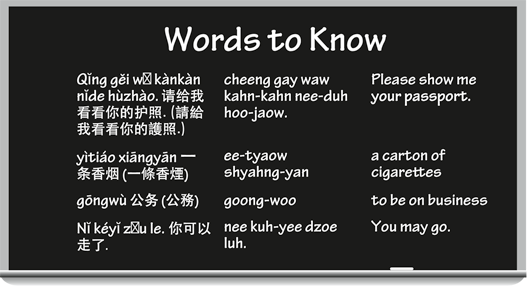
Navigating Around Town
It’s Friday night, and you just had a pretty successful day doing business with your Chinese counterparts. You’ve finally mustered the courage to venture out of your hotel room for a night on the town. You decide to check out a popular dance hall, and you begin to determine what mode of transport can best get you there.
No matter what form of jiāotōng 交通 (jyaow-toong) (transportation) you end up taking, here are a few crucial words and phrases to know:
 fāngxiàng 方向 (fahng-shyahng) (directions)
fāngxiàng 方向 (fahng-shyahng) (directions)
 dìtú 地图 (地圖) (dee-too) (map)
dìtú 地图 (地圖) (dee-too) (map)
 Wǒ mílù le. 我迷路了. (waw mee-loo luh.) (I’m lost.)
Wǒ mílù le. 我迷路了. (waw mee-loo luh.) (I’m lost.)
Hailing a cab
Although zìxíngchē 自行车 (自行車) (dzuh-sheeng-chuh) (bicycles), mótuōchē 摩托车 (摩托車) (maw-twaw-chuh) (motorcycles), mǎchē 马车 (馬車) (mah-chuh) (horse-drawn carts), and even niú 牛 (nyo) (cows) are still the main forms of transportation for the average individual in some parts of mainland China, most foreigners take taxis wherever they go. You can easily find taxis around hotels, and cabs are certainly more comfortable and convenient than having to deal with nonexistent rules of the road; breathing in air pollution while bicycling; finding your way through a maze of old alleyways; or, depending on the time of year, leaving yourself to the mercy of the natural elements.
Here’s what you say to the hotel door attendant if you want help hailing a cab: Wǒ yào jiào jìchéngchē. 我要叫计程车. (我要叫計程車.) (waw yaow jyaow jee-chung-chuh.) (I’d like a taxi.)
After you’re safely ensconced in the cab, you need to know how to say the following phrases:
 Nǐ kéyǐ děng jǐ fēn zhōng ma? 你可以等几分钟吗? (你可以等幾分鐘嗎?) (nee kuh-yee duhng jee fun joong mah?) (Can you wait a few minutes?)
Nǐ kéyǐ děng jǐ fēn zhōng ma? 你可以等几分钟吗? (你可以等幾分鐘嗎?) (nee kuh-yee duhng jee fun joong mah?) (Can you wait a few minutes?)
 Qǐng dǎ biǎo. 请打表. (請打表.) (cheeng dah byaow.) (Please turn on the meter.)
Qǐng dǎ biǎo. 请打表. (請打表.) (cheeng dah byaow.) (Please turn on the meter.)
 Qǐng dài wǒ dào zhèige dìzhǐ. 请带我到这个地址. (請帶我到這個地址.) (cheeng dye waw daow jay-guh dee-jir.) (Please take me to this address.)
Qǐng dài wǒ dào zhèige dìzhǐ. 请带我到这个地址. (請帶我到這個地址.) (cheeng dye waw daow jay-guh dee-jir.) (Please take me to this address.)
 Qǐng kāi kuài yìdiǎr. 请开快一点儿. (請開快一點兒.) (cheeng kye kwye ee-dyar.) (Please drive a little faster.)
Qǐng kāi kuài yìdiǎr. 请开快一点儿. (請開快一點兒.) (cheeng kye kwye ee-dyar.) (Please drive a little faster.)
 Qǐng kāi màn yìdiǎr. 请开慢一点儿. (請開慢一點兒.) (cheeng kye mahn ee-dyar.) (Please drive a little slower.)
Qǐng kāi màn yìdiǎr. 请开慢一点儿. (請開慢一點兒.) (cheeng kye mahn ee-dyar.) (Please drive a little slower.)
 Qǐng zǒu fēngjǐng hǎo de lù. 请走风景好的路. (請走風景好的路.) (cheeng dzoe fung-jeeng how duh loo.) (Please take a scenic route.)
Qǐng zǒu fēngjǐng hǎo de lù. 请走风景好的路. (請走風景好的路.) (cheeng dzoe fung-jeeng how duh loo.) (Please take a scenic route.)
 Wǒ děi gǎn shíjiān. 我得赶时间. (我得趕時間.) (waw day gahn shir-jyan.) (I’m in a hurry.)
Wǒ děi gǎn shíjiān. 我得赶时间. (我得趕時間.) (waw day gahn shir-jyan.) (I’m in a hurry.)
 Zài zhèr guǎi wār. 在这儿拐弯儿. (在這兒拐彎兒.) (dzye jar gwye wahr.) (Turn here.)
Zài zhèr guǎi wār. 在这儿拐弯儿. (在這兒拐彎兒.) (dzye jar gwye wahr.) (Turn here.)
Oh, and one more thing. As you set off with your taxi sījī 司机 (司機) (suh-jee) (driver), make sure you put on your ānquándài 安全带 (ahn-chwan-dye) (seat belt).
Finally, before you get out of the cab, these phrases may come in handy for price negotiations:
 Bié qīpiàn wǒ. 别欺骗我. (別欺騙我.) (byeh chee-pyan waw.) (Don’t cheat me.)
Bié qīpiàn wǒ. 别欺骗我. (別欺騙我.) (byeh chee-pyan waw.) (Don’t cheat me.)
 Bú yòng zhǎo le. 不用找了. (boo yoong jaow luh.) (Keep the change.)
Bú yòng zhǎo le. 不用找了. (boo yoong jaow luh.) (Keep the change.)
 Kāi wán xiào! Wǒ jùjué fù zhèmme duō qián. 开玩笑! 我拒绝付这么多钱. (開玩笑! 我拒絕付這麼多錢.) (kye wahn shyaow! waw jyew-jweh foo juhmmuh dwaw chyan.) (You’ve got to be kidding! I refuse to pay so much.)
Kāi wán xiào! Wǒ jùjué fù zhèmme duō qián. 开玩笑! 我拒绝付这么多钱. (開玩笑! 我拒絕付這麼多錢.) (kye wahn shyaow! waw jyew-jweh foo juhmmuh dwaw chyan.) (You’ve got to be kidding! I refuse to pay so much.)
 Qǐng gěi wǒ shōujù. 请给我收据. (請給我收據.) (cheeng gay waw show-jyew.) (Please give me a receipt.)
Qǐng gěi wǒ shōujù. 请给我收据. (請給我收據.) (cheeng gay waw show-jyew.) (Please give me a receipt.)
 Wǒ gāi gěi nǐ duōshǎo qián? 我该给你多少钱? (我該給你多少錢?) (waw guy gay nee dwaw-shaow chyan?) (How much do I owe you?)
Wǒ gāi gěi nǐ duōshǎo qián? 我该给你多少钱? (我該給你多少錢?) (waw guy gay nee dwaw-shaow chyan?) (How much do I owe you?)
 Wǒ huì àn biǎo fù kuǎn. 我会按表付款. (我會按表付款.) (waw hway ahn byaow foo kwahn.) (I’ll pay what the meter says.)
Wǒ huì àn biǎo fù kuǎn. 我会按表付款. (我會按表付款.) (waw hway ahn byaow foo kwahn.) (I’ll pay what the meter says.)
Talkin’ the Talk
Bill ventures out for a night on the town and needs a cab. He enlists the help of his hotel doorman.
Bill:
Wǒ yào jiào jìchéngchē.
waw yaow jyaow jee-chung-chuh.
I’d like a taxi.
Doorman:
Hǎo.
how.
Certainly.
Bill enters the cab and shows the driver a card with the name and address of a local nightclub.
Bill:
Qǐng dài wǒ dào zhèige yèzǒnghuì.
cheeng dye waw daow jay-guh yeh-dzoong-hway.
Please take me to this nightclub.
Driver:
Méiyǒu wèntí.
mayo one-tee.
No problem.
Bill:
Wǒ bùjí. Qǐng kāi màn yìdiǎr.
waw boo-jee. cheeng kye mahn ee-dyar.
I’m not in a hurry. Please drive a little slower.
Bill finally reaches the nightclub after his scenic cab drive.
Bill:
Wǒ gāi gěi nǐ duōshǎo qián?
waw guy gay nee dwaw-shaow chyan?
How much do I owe you?
Driver:
Shí kuài liǎng máo wǔ.
shir kwye lyahng maow woo.
That will be $10.25.
Bill hands the driver $15.
Bill:
Qǐng gěi wǒ shōujù. Bú yòng zhǎo le.
cheeng gay waw show-jyew. boo yoong jaow luh.
Please give me a receipt. Keep the change.
Driver:
Hǎo. Xièxiè.
how. shyeh-shyeh.
Okay. Thanks.
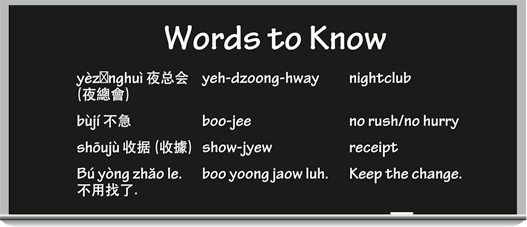
Hopping on the bus
Gōnggòng qìchē 公共汽车 (公共汽車) (goong-goong chee-chuh) (buses) are almost as common as bicycles in China. They also cost much less than taxis. But here’s the catch: Bus drivers usually don’t speak a word of English, signs are only in Chinese, and the buses are always super crowded. Still, if you’re game for a unique travel experience and you don’t mind killing time waiting for the bus, put these phrases in your carry-on bag:
 Chē piào duōshǎo qián? 车票多少钱? (車票多少錢?) (chuh pyaow dwaw-shaow chyan?) (How much is the fare?)
Chē piào duōshǎo qián? 车票多少钱? (車票多少錢?) (chuh pyaow dwaw-shaow chyan?) (How much is the fare?)
 Duōjiǔ lái yítàng? 多久来一趟? (多久來一趟?) (dwaw-jyo lye ee-tahng?) (How often does it come?)
Duōjiǔ lái yítàng? 多久来一趟? (多久來一趟?) (dwaw-jyo lye ee-tahng?) (How often does it come?)
 Gōnggòng qìchē zhàn zài nǎr? 公共汽车站在哪儿? (公共汽車站在哪兒?) (goong-goong chee-chuh jahn dzye nar?) (Where’s the bus station?)
Gōnggòng qìchē zhàn zài nǎr? 公共汽车站在哪儿? (公共汽車站在哪兒?) (goong-goong chee-chuh jahn dzye nar?) (Where’s the bus station?)
 Qǐng gàosù wǒ zài nǎr xià chē. 请告诉我在哪儿下车. (請告訴我在哪兒下車.) (cheeng gaow-soo waw dzye nar shyah chuh.) (Please let me know where to get off.)
Qǐng gàosù wǒ zài nǎr xià chē. 请告诉我在哪儿下车. (請告訴我在哪兒下車.) (cheeng gaow-soo waw dzye nar shyah chuh.) (Please let me know where to get off.)
 Yīnggāi zuò jǐ lù chē? 应该坐几路车? (應該坐幾路車?) (eeng-guy dzwaw jee loo chuh?) (Which [number] bus should I take?)
Yīnggāi zuò jǐ lù chē? 应该坐几路车? (應該坐幾路車?) (eeng-guy dzwaw jee loo chuh?) (Which [number] bus should I take?)
Talkin’ the Talk
Charlie is walking along the street, trying to find a bus that can take him to the famous Shilin night market in Taiwan. He sees his old friend Louise, and after saying hello, he asks her for help.
Charlie:
Qù Shílín yīnggāi zuò jǐ lù gōnggòng qìchē?
chyew shir-leen eeng-guy dzwaw jee loo goong-goong chee-chuh?
Which bus should I take to go to Shilin?
Louise:
Yīnggāi zuò sān lù chē. Nèige gōnggòng qìchē zhàn jiù zài zhèr.
eeng-guy dzwaw sahn loo chuh. nay-guh goong-goong chee-chuh jahn jyo dzye jar.
You should take the number 3 bus. That bus stop is right here.
Charlie:
Tài hǎo le. Duōjiǔ lái yítàng?
tye how luh. dwaw-jyo lye ee-tahng?
That’s great. How often does it come?
Louise:
Měi sānshí fēn zhōng. Hái hǎo.
may sahn-shir fun joong. hi how.
Every 30 minutes. That’s not too bad.
Charlie:
Xièxiè nǐ.
shyeh-shyeh nee.
Thank you.
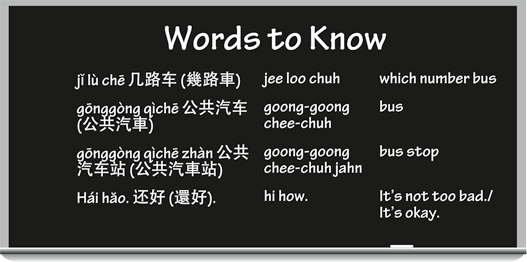
Riding the rails
If you want to get where you need to go really quickly, especially in Hong Kong or New York, the fastest way to get there may take you below the ground — to the dìtiě 地铁 (地鐵) (dee-tyeh) (subway). Most dìtiě zhàn 地铁站 (地鐵站) (dee-tyeh jahn) (subway stations) are pretty easy to navigate.
Unlike in Hong Kong, the subway system in mainland China is relatively new, and you find stations in less than a handful of cities. Above-ground huǒchē 火车 (火車) (hwaw-chuh) (train) travel, however, is tried and true — especially because China is such a huge place and distances between cities are so great. Unlike the number of subway stations, you can find plenty of huǒchēzhàn 火车站 (火車站) (hwaw-chuh-jahn) (train stations) in China. They even come equipped with waiting rooms.
Table 16-2 Seating Accommodations on Trains
|
Chinese |
Pronunciation |
English |
|
ruǎnwò 软卧 (軟臥) |
rwahn-waw |
soft sleeper |
|
ruǎnzuò 软座 (軟座) |
rwan-dzwaw |
soft seat |
|
shàngpù 上铺 (上舖) |
shahng-poo |
upper berth |
|
xiàpù 下铺 (下舖) |
shyah-poo |
lower berth |
|
yìngwò 硬卧 |
eeng-waw |
hard sleeper |
|
yìngzuò 硬座 |
eeng-dzwaw |
hard seat |
Before you shàngchē 上车 (上車) (shahng-chuh) (board the train) to enjoy your comfy, soft seat, you need to go to the shòupiàochù 售票处 (售票處) (show-pyaow-choo) (ticket office) to buy your ticket. You use the following words and phrases to get the job done:
 dānchéngpiào 单程票 (單程票) (dahn-chuhng-pyaow) (one-way ticket)
dānchéngpiào 单程票 (單程票) (dahn-chuhng-pyaow) (one-way ticket)
 láihuípiào 来回票 (來回票) (lye-hway-pyaow) (round-trip ticket)
láihuípiào 来回票 (來回票) (lye-hway-pyaow) (round-trip ticket)
 mànchē 慢车 (慢車) (mahn-chuh) (local train)
mànchē 慢车 (慢車) (mahn-chuh) (local train)
 piào 票 (pyaow) (ticket)
piào 票 (pyaow) (ticket)
 piàojià 票价 (票價) (pyaow-jyah) (fare)
piàojià 票价 (票價) (pyaow-jyah) (fare)
 tèkuài 特快 (tuh-kwye) (express train)
tèkuài 特快 (tuh-kwye) (express train)
The following may come in handy at the train station:
 Huǒchē cóng něige zhàntái kāi? 火车从哪个站台开? (火車從哪個站台開?) (hwaw-chuh tsoong nay-guh jahn-tye kye?) (Which gate does the train leave from?)
Huǒchē cóng něige zhàntái kāi? 火车从哪个站台开? (火車從哪個站台開?) (hwaw-chuh tsoong nay-guh jahn-tye kye?) (Which gate does the train leave from?)
 Piàofáng zài nǎr? 票房在哪儿? (票房在哪兒?) (pyaow-fahng dzye nar?) (Where’s the ticket office?)
Piàofáng zài nǎr? 票房在哪儿? (票房在哪兒?) (pyaow-fahng dzye nar?) (Where’s the ticket office?)
 Notice the different way of saying ticket office in this question. Options abound in the Chinese language.
Notice the different way of saying ticket office in this question. Options abound in the Chinese language.
 Wǒ yào yìzhāng yìngwò piào. 我要一张硬卧票. (我要一張硬臥票.) (waw yow ee-jahng eeng-waw pyaow.) (I’d like a hard-sleeper ticket.)
Wǒ yào yìzhāng yìngwò piào. 我要一张硬卧票. (我要一張硬臥票.) (waw yow ee-jahng eeng-waw pyaow.) (I’d like a hard-sleeper ticket.)
And when you finally hear the lièchēyuán 列车员 (列車員) (lyeh-chuh-ywan) (conductor) say Shàng chē le! 上车了! (上車了!) (shahng chuh luh!) (All aboard!), you can board and ask the following questions:
 Cānchē zài nǎr? 餐车在哪儿? (餐車在哪兒?) (tsahn-chuh dzye nar?) (Where’s the dining car?)
Cānchē zài nǎr? 餐车在哪儿? (餐車在哪兒?) (tsahn-chuh dzye nar?) (Where’s the dining car?)
 Zhèige zuòwèi yǒu rén ma? 这个座位有人吗? (这個座位有人嗎?) (jay-guh dzwaw-way yo run mah?) (Is this seat taken?)
Zhèige zuòwèi yǒu rén ma? 这个座位有人吗? (这個座位有人嗎?) (jay-guh dzwaw-way yo run mah?) (Is this seat taken?)
Talkin’ the Talk
Candice is at the Beijing train station to buy a round-trip ticket to Shanghai for tomorrow. She approaches a ticket agent to purchase her ticket.
Candice:
Qǐngwèn, yǒu méiyǒu míngtiān qù Shànghǎi de huǒchē piào?
cheeng-one, yo mayo meeng-tyan chyew shahng-hi duh hwaw-chuh pyaow?
Excuse me, do you have any train tickets to Shanghai for tomorrow?
Ticket agent:
Yǒu. Yào jǐ zhāng?
yo. yaow jee jahng?
Yes. How many would you like?
Candice:
Zhǐ yì zhāng lái huí piào. Xiàge lǐbàiyī yào huí lái.
jir ee jahng lye hway pyaow. shyah-guh lee-bye-ee yaow hway lye.
Just one round-trip ticket. I’d like to return next Monday.
Ticket agent:
Hǎo. Yào yìngwò, ruǎnwò, háishì ruǎnzuò?
how. yaow eeng-waw, rwahn-waw, hi-shir rwahn-dzwaw?
Okay. Would you like a hard sleeper, a soft sleeper, or a soft seat?
Candice:
Wǒ yào yì zhāng ruǎnwò. Xièxiè.
waw yaow ee jahng rwahn-waw. shyeh-shyeh.
I’d like a soft sleeper. Thanks.
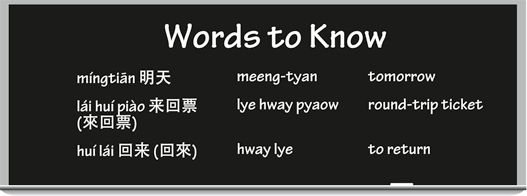
 Fun & Games
Fun & Games
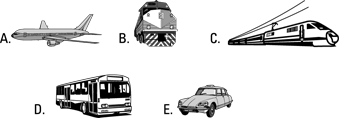
How do you say these types of transportation in Chinese? (Flip to Appendix D for the answers.)
A. ______________
B. ______________
C. ______________
D. ______________
E. ______________


 Renting a car is virtually impossible in China. Cars just aren’t available. And even if you can find a rental, you may not want to get one, given the bureaucracy and driving conditions. Signs aren’t printed in English, which is probably the main reason you shouldn’t even attempt driving. Just think of the upside. You don’t have to suddenly learn how to use a stick shift or purchase any extra car insurance. Let someone else worry about how to get you from point A to point B.
Renting a car is virtually impossible in China. Cars just aren’t available. And even if you can find a rental, you may not want to get one, given the bureaucracy and driving conditions. Signs aren’t printed in English, which is probably the main reason you shouldn’t even attempt driving. Just think of the upside. You don’t have to suddenly learn how to use a stick shift or purchase any extra car insurance. Let someone else worry about how to get you from point A to point B. February is a particularly risky month to attempt long-distance train travel, because the shortest month often features the Chinese New Year, and you’re bound to meet what seems like the entire country traveling from one part of China to another. Make sure you consult a
February is a particularly risky month to attempt long-distance train travel, because the shortest month often features the Chinese New Year, and you’re bound to meet what seems like the entire country traveling from one part of China to another. Make sure you consult a